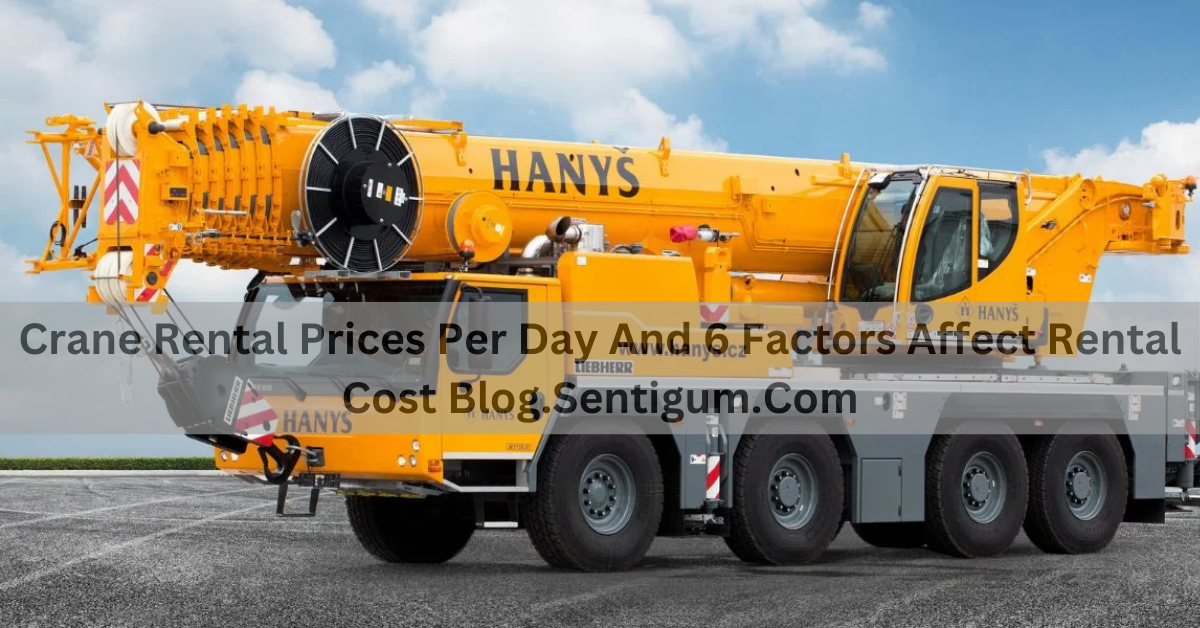Are you managing a construction project that requires lifting or transporting heavy materials? If so, you might be considering renting a crane. Daily crane rental prices can vary significantly, and understanding the factors that influence these costs is crucial for accurate budgeting.
In this guide, we’ll explore Crane Rental Prices Per Day and the 6 Key Factors That Affect Rental Costs, as detailed on Blog.sentigum.com.
Category of Cranes and Daily Rental Charges
Small Portable Cranes:
Description: Small portable cranes are compact, lightweight, and easy to set up, making them ideal for light lifting in confined spaces. These cranes are commonly used in residential projects, small warehouses, or workshops for lifting loads like beams, small equipment, or building materials.
- Advantages: Easy mobility, affordability, and minimal setup requirements.
- Applications: Roofing, HVAC installations, and light construction work.
- Daily Rental Charges: $100–$200 per day, depending on the model and lifting capacity.
Mobile Cranes:
Description: Mobile cranes are versatile and mounted on wheels or tracks, allowing them to operate in various terrains. These cranes can be quickly transported to different sites and are widely used in construction, logistics, and event setups.
- Advantages: Flexibility, quick setup, and mobility.
- Applications: Bridge construction, building projects, and industrial installations.
- Daily Rental Charges: $300–$1,000 per day, influenced by capacity and model type.
Tower Cranes:
Description: Tower cranes are fixed, tall structures designed for large-scale construction projects like skyscrapers, high-rise buildings, and bridges. Their impressive height and lifting capacity make them a staple in urban construction.
- Advantages: Extended height and reach, robust lifting capabilities.
- Applications: Large-scale construction projects.
- Daily Rental Charges: $1,500–$5,000 per day, depending on the crane’s size and specifications.
Crawler Cranes:
Description: Crawler cranes are heavy-duty machines with tracks instead of wheels, offering stability on soft or uneven terrain. These cranes are ideal for long-term projects involving massive lifting tasks.
- Advantages: Excellent stability and suitability for challenging terrains.
- Applications: Infrastructure projects, wind farm installations, and power plant construction.
- Daily Rental Charges: $3,000–$10,000 per day, reflecting their specialized nature and high capacity.
6 Significant Variables Affecting Crane Rental Price
Type of Crane:
- The specific type of crane needed for your project heavily influences rental costs.
- Specialized cranes like crawler or tower cranes often come with higher prices due to their advanced capabilities.
Size of the Crane:
- Larger cranes with higher lifting capacities are costlier to rent.
- Choose a crane that aligns with your project needs to avoid paying extra for unused capacity.
Rental Duration:
- Rental agreements often offer discounted rates for longer durations.
- However, short-term rentals might have higher daily rates due to increased logistics and setup costs.
Location
- Urban areas with higher demand often have elevated rental prices.
- Transportation costs to remote locations can also add to the total expense.
Project Requirements:
- Unique project needs, such as working in tight spaces or extreme weather conditions, may necessitate customizations or additional equipment.
- These factors can significantly increase costs.
Extra Services:
- Many rental companies offer optional services like operators, maintenance, and insurance.
- While convenient, these add-ons can raise the overall cost.
Tips for Managing Crane Rental Costs:
- Plan Your Needs Thoroughly: Outline your project requirements to avoid renting a crane with unnecessary features.
- Compare Quotes: Obtain estimates from multiple rental companies to ensure competitive pricing.
- Bundle Services: Look for rental packages that include operators, transportation, and maintenance to save money.
- Optimize Rental Periods: Align crane rental with project schedules to avoid idle equipment time.
- Negotiate Contracts: Ask about discounts for long-term rentals or repeat business.
Why Renting a Crane is Often Better Than Buying?
Renting a crane has several advantages over purchasing:
- Lower Upfront Costs: Buying a crane requires significant investment, often impractical for short-term projects.
- Maintenance-Free: Rental companies handle maintenance and repairs, saving you time and money.
- Access to Modern Equipment: Renting ensures access to the latest crane technology and models.
- Flexibility: You can rent different types of cranes for various projects, offering unmatched adaptability.
Selection of the Right Crane for a Project:
Selecting the ideal crane involves considering:
- Lifting Requirements: Evaluate the weight and dimensions of the load.
- Terrain Conditions: Choose a crane suited for the site, such as crawler cranes for rough terrain or mobile cranes for paved areas.
- Height and Reach: Ensure the crane can reach the required elevation.
- Budget Constraints: Select a crane that meets your needs without exceeding your budget.
Other Expenses to Bear in Mind Next to Crane Rental Costs:
- Transportation Costs: Delivery and retrieval charges depend on the distance between the rental company and the project site.
- Insurance: Protects against damage or accidents involving the crane.
- Permit Fees: Some projects may require special permits, especially in urban areas.
- Operator Costs: Hiring certified operators ensures safety and efficiency but adds to the expense.
- Fuel and Power: Daily operating costs for diesel or electricity should be considered.
Conclusion
Renting a crane offers flexibility, cost savings, and access to state-of-the-art equipment, making it an attractive option for many projects. By understanding crane types, rental costs, and associated expenses, you can select the right equipment and manage costs effectively. Plan thoroughly, negotiate wisely, and choose cranes that align with your project’s specific requirements for successful and cost-efficient operations.
